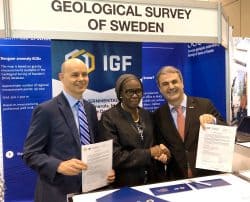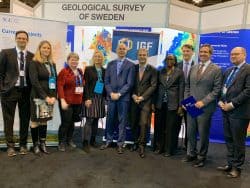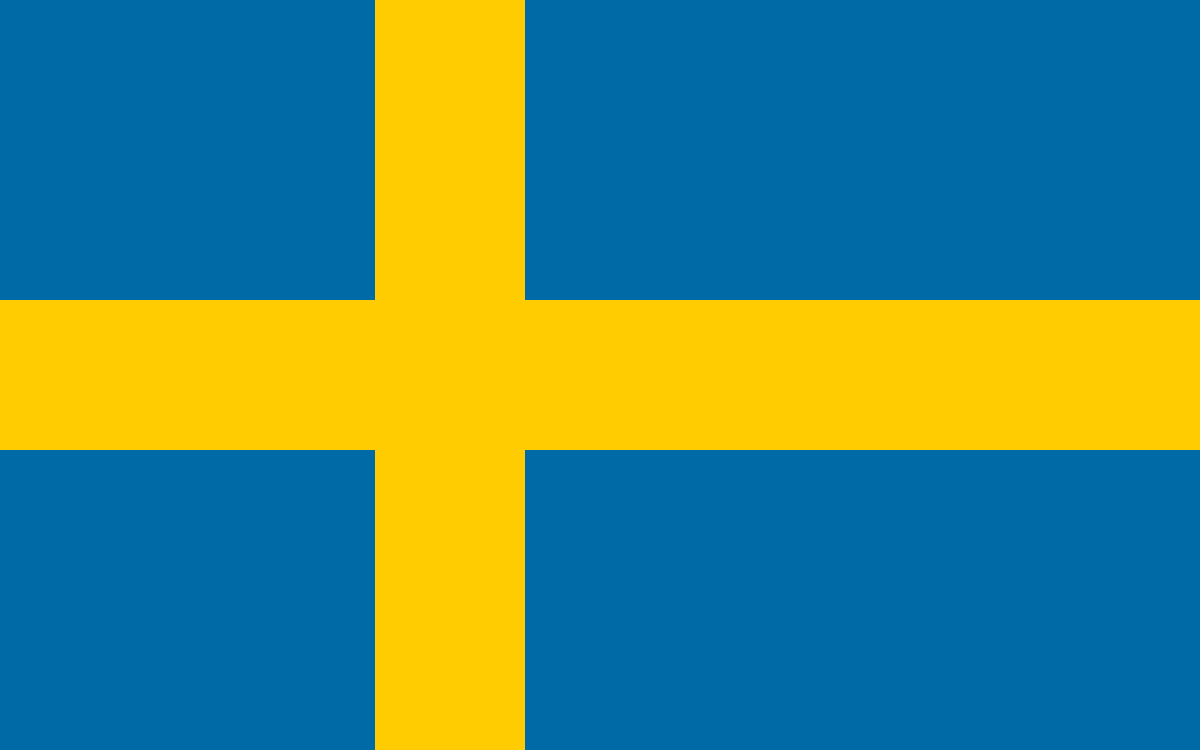The Government of Sweden expressed its commitment to responsible governance of the mining sector by joining the Intergovernmental Forum on Mining, Minerals, Metals and Sustainable Development (IGF). The IGF is a voluntary partnership that welcomes member states of the United Nations.
“We are pleased to welcome Sweden as the IGF’s 76th member state,” IGF Director Greg Radford said in a statement.
“IGF is pleased with the recent growth of its membership in Africa, Asia, the Middle East and now in Europe,” added Radford. “We look forward to the Kingdom of Sweden’s contribution in our global dialogue about leveraging mining for poverty reduction, inclusive growth, social development and environmental stewardship.”

Pictured – Ibrahim Baylan, Sweden’s Minister for Business, Industry and Innovation, Ministry of Enterprise and Innovation, and Greg Radford, Director, IGF, during the membership signing ceremony at PDAC 2020 alongside Rokhaya Samba, Chair, IGF Executive Committee.
“Sweden is delighted to become a member of the IGF,” said Ibrahim Baylan, Sweden’s Minister for Business, Industry and Innovation, of the Ministry of Enterprise and Innovation. “This unique forum provides a very valuable opportunity to engage with our 75 fellow member countries on a broad range of important policy issues such as development, environment, gender equality, mine closure and responsible supply chains.”
Sweden has a rich geology and a long history of mining with a proven track record in copper, lead, zinc, gold and iron production. It is also a significant producer of development minerals, till, and peat. Its history in mining and metal refining stretches back more than a thousand years, and today Sweden is one of the EU’s leading ore and metal producers. Sweden is by far the largest iron ore producer in the EU and is also among the foremost producers of base and precious metals.
Many Swedish engineering companies have their origins in the mining industry and are today world leaders in mining equipment and mining technology. Besides metal mines, the country is a major producer of industrial minerals, part of which is directly linked to the production of metals.
“Through its IGF membership, Sweden hopes to be able to share its own best practice policies and learn from the experience of others as we work together on ensuring that mining contributes fully in the achievement of the UN Sustainable Development Goals,” Minister Baylan said during the signing ceremony, held on the sidelines of this year’s PDAC event.
Sweden recognizes the challenges and contributions of sustainable management of metal and mineral resources for achieving the UN Sustainable Development Goals and their related targets. Its mining policies reflect this recognition, for example in its development of a “best practice” training on environment and mining, including planning for mine closure and post-mining transition.

Pictured – Team members from the Government of Sweden and IGF after the signing ceremony at PDAC 2020.
In addition, Sweden is planning for a transition from iron mining toward mining of innovation-critical metals and minerals and has revised its identification and mapping of such minerals over the past year. Supplying minerals for the transition to low-carbon and high-tech economies is one of Sweden’s top priorities, as well as for other European countries.
In the Fraser Institute Annual Survey of Mining Companies, 2019, Europe ranked as the most attractive region in the world for mining investment, above Australia and Canada. As a mining jurisdiction, Sweden has consistently been highly placed in the Fraser Institute Annual Survey of Mining Companies. The country’s investment attractiveness was ranked 10th of 76 globally, and among the highest in Europe as a destination for mining sector investment (Fraser Institute, 2019).
The ranking is based both on its modern mining and environmental legislation, stable and progressive legal system, educated and skilled workforce, experienced regulators, a globally recognised cluster of mining service and equipment providers, a stable democratic government and EU membership.
“We see our involvement with the IGF and its member countries as a crucial element in helping to ensure that our exploration and mining sector is optimally positioned to help deliver on the ambition of the UN Sustainable Development Goals by 2030,” added Minister Baylan. The IGF supports more than 70 nations committed to leveraging mining for sustainable development to ensure that negative impacts are limited and financial benefits are shared. It is devoted to optimizing the benefits of mining to achieve poverty reduction, inclusive growth, social development and environmental stewardship. The International Institute for Sustainable Development has served as Secretariat for the IGF since October 2015. Core funding is provided by the Government of Canada.
For more information, please contact us at IGF Secretariat secretariat@igfmining.org.

